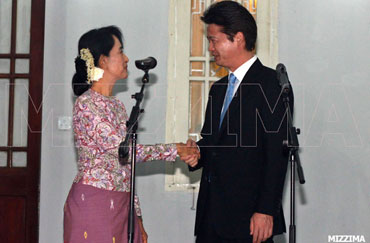Chiang Mai (Mizzima) – Japan and Burma have agreed to start negotiations to restart economic development aid.
 Japanese Foreign Minister Koichiro Gemba told the media of the agreement on Monday, after meeting with opposition leader Aung San Suu Kyi at her home in Rangoon.
Japanese Foreign Minister Koichiro Gemba told the media of the agreement on Monday, after meeting with opposition leader Aung San Suu Kyi at her home in Rangoon.
During his two-day visit, Koichiro Gemba also met with Burmese President Thein Sein, Burmese Foreign Affairs Minister Wunna Maung Lwin and the Union Solidarity and Development Party (USDP) general secretary Htay Oo in Naypyitaw.
The Japanese foreign minister said he discussed with government officials and Suu Kyi how Japan could assist in establishing national reconciliation and moving the democratization process ahead at a faster pace.
“The Japanese government would like to help and support the Burmese government’s efforts as much as it can,” Koichiro Gemba said. Japan is ranked 12th in foreign investment in Burma with US$ 212 million, according to the China-based Xinhua News Agency.
Aung San Suu Kyi urged Japan to take account of Burma’s law enforcement process, to try to enhance key democratic institutions in Burma, and to consider all ethnic groups.
“To achieve unity among all our ethnic people, when Japan provides helps to us for humanity and development, I told him that they need to provide help also to ethnic areas equally,” Aung San Suu Kyi told reporters on Monday.
About one week before the foreign minister’s visit to Burma, U.S. Secretary of State Hillary Clinton also visited Burma. Clinton told Japanese officials that the U.S. and Japan “have a real opportunity through sustained diplomacy to test the new government and to overcome the obstacles in the way to Burma achieving its rightful place in the community of nations,” according to the U.S. State Department.
The Japan-based Federation of Trade Unions of Burma (FTUB) patron Dr. Min Nyo told Mizzima that Japan, a top ally of the U.S., is preparing to promote business cooperation with Burma and the Japanese trade minister Yukio Edano will also visit Burma around January 20.
“He will scout what the Japanese government can do to help Burma,” Min Nyo said. Prior to Edano’s visit, a group of Japanese Upper House MPs will also visit Burma.
Hla Maung Shwe, an executive with the Union of Myanmar Federation of Chambers of Commerce and Industry, said that presently Japan would promote Burma’s tourism and clothing sectors and in mid-2012 it would promote other sectors.
“By mid-2012, we will have relaxed some restrictions and people will trust more in the Parliament. I hope that the law will be able to protect more rights at that time so we can cooperate more,” Hla Maung Shwe told Mizzima.
Koichiro Gemba said that Japanese officials will conduct fact finding studies to invest in the Thilawa Port project near Rangoon and Japan will cooperate with Burma in health, education, poverty alleviation and farming. Moreover, he said Japan would send experts in February 2012 to maintain ancient pagodas and temples in Bagan.
Presently, Japan’s Nippon Oil Company is cooperating with Premier, Myanmar Oil and Gas Enterprise and PTT-EP in the offshore Yetagun natural gas blocks in the Gulf of Martaban. Japanese companies are also exploring up to 18 inland oil and natural gas blocks in Burma, according to Burma’s Ministry of Energy.
Three days before the Japanese foreign minister’s visit to Burma, Japanese Lower House MP and general secretary of the Japan Parliamentary League for Japan-Myanmar Friendship, Kazuya Shimba, met with Union of Myanmar Federation of Chambers of Commerce and Industry to discuss Burma’s education, social affairs and human resources needs. They also discussed setting up industrial zones in Burma and Japanese businesses that might invest in such zones.
Koichiro Gemba invited Burmese President Thein Sein to attend the 2012 Mekong-Japan Summit and he invited Aung San Suu Kyi to visit Japan to observe the rebuilding in earthquake hit areas in eastern Japan.
Koichiro Gemba, who became Japanese Foreign Minister in September 2011, will also visit Thailand and Cambodia.


